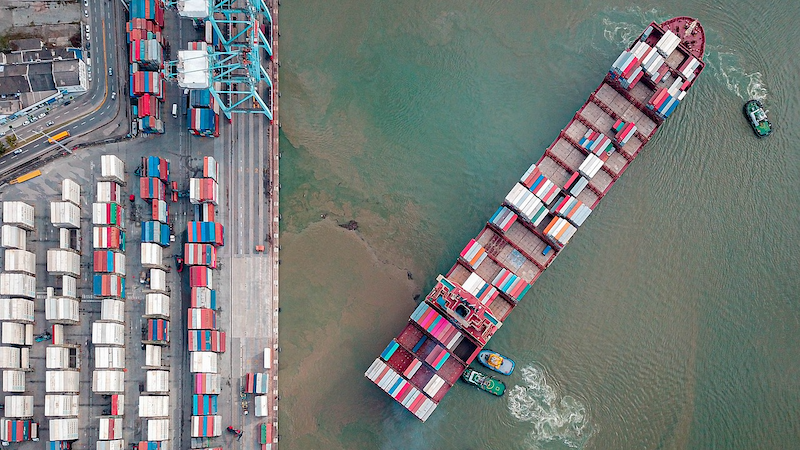
By Mark Thornton
With the world moving more and more in the direction of trade protectionism and war, it is worth remembering the origin of the fallacies upon which this movement is based.
Michel Montaigne, the sixteenth-century minor politician and writer, is credited with the illogical view that trade and exchange result in one person winning and the other losing. Today this view is called “zero-sum thinking.” The fallacy is the foundation of former President Donald Trump’s protectionist trade policies and President Joe Biden’s protectionist trade policies, as well as a whole host of irrational government policies, from “protecting jobs” to war.
Montaigne lived in the high times of King Louis XIV, the sinister economic French minister Jean Baptiste Colbert, and the heyday of mercantilism, a hodgepodge of protectionism, colonialism, slavery, and the rise of central state power. As a “philosopher,” Montaigne was a skeptic who did not believe in the power of human reason and logic, the possibility of truth, the goodness of nature, or the existence of any kind of God. Despite his “philosophy,” he did believe in the appearances of religion and the monopoly of the Catholic church, as well as the complete unrestricted power of the state.
Without access to human reason and without the hope of discovering the truth of the nature of man, how could one stand against anything in the existing order of things? Blind obedience was his rule. Apparently, the status quo was always perfect, and we could never know anything else.
Not surprisingly, he was also a thoroughgoing Machiavellian. While we can all see that lying and deceit are a normal and regrettable part of politics and government, Montaigne saw such vices in a positive light of “sewing our society together” and as “poisons for the preservation of our health.”
As such, he saw the day-to-day voluntary interactions of people as mortal and moral battles, and trading between nations were acts of warfare. His most famous writing, Essay Number 22, is provocatively titled, “The Plight of One Man Is the Benefit of Another.” Never mind that the earliest, most obvious, and most generalizable philosophical conclusion is the mutual advantages and benefits of exchange.
In Montaigne’s fallacy, the funeral director benefits at the expense of people who die, the farmer benefits from the hungry, physicians benefit from the sick, and clothiers benefits from the naked.
Montaigne and his fallacy take the great illogical leap over two facts: first, none of these businesspeople create problems such as hunger and death, and second, they actually help people address or solve these problems. It’s not a zero sum of winners and losers. Both parties, both sides of the exchanges and trades benefit, gain, profit, and are fulfilled from such trades.
Montaigne’s dog-eat-dog world is actually a world of widespread cooperation and mutual benefit.
The great Austrian-born economist Ludwig von Mises is often credited with labeling zero-sum thinking as the “Montaigne dogma or fallacy.” He;explains the fallacy;in “non-philosophical” terms everyone can easily grasp:
What produces a man’s profit in the course of affairs within an unhampered market society is not his fellow citizen’s plight and distress, but the fact that he alleviates or entirely removes what causes his fellow citizen’s feeling of uneasiness. What hurts the sick is the plague, not the physician who treats the disease. The doctor’s gain is not an outcome of the epidemics, but of the aid he gives to those affected. The ultimate source of profits is always the foresight of future conditions. Those who succeeded better than others in anticipating future events and in adjusting their activities to the future state of the market, reap profits because they are in a position to satisfy the most urgent needs of the public.
Because his logic is so convincing in terms of our own daily dealings, it is important to remember that Mises was more concerned about the Montaigne fallacy at the international level where illogical words can quickly mutate into wars.
Chastising Voltaire, Mises;wrote, “The statement that one man’s boon is the other man’s damage is valid with regard to robbery, war, and booty. The robber’s plunder is the damage of the despoiled victim. But war and commerce are two different things.”
The spirit of conquest applied to trade has been embraced by political leaders, and supporters have prevented a truly peaceful and prosperous world order. “It is monstrous that Emperor Napoleon III, should have written: ‘The quantity of merchandise which a country exports is always in direct proportion to the number of shells it can discharge upon its enemies whenever its honor and its dignity may require it.’” Arguments for protectionism of various sorts are often more alluring than when Mises provides the proper context. Indeed, deceit and obfuscation are easy to come by when the payoff for interest groups from such propaganda is so high. Insinuations to patriotism, good high-paying jobs, and double-crossing foreigners can be easy to shallow.
The solution begins with our own personal commitment to the liberal ideology of peace and an unfettered free market.
With both candidates for United States president firmly in the pocket of the Montaigne dogma, we need not delude ourselves as to the outcome, but rather we should steel ourselves to follow Mises’s advice to “disclose the sources of the popularity of this (fallacy) and other similar delusions and errors.”